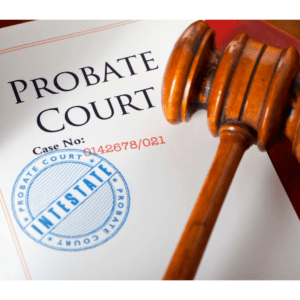What Is Probate?
Understanding the Estate Administration Process in NC

Your mom dies. You are grieving and trying to figure out what you need to do. A friend tells you that you need to go to probate court. But what is probate?
Probate In A Nutshell
In a nutshell, “probate” is a legal process to handle a decedent’s affairs. When someone dies, you present the original will, if you have one, to the court to determine whether the will is valid. The court then officially issues letters of authority to the named Executor in the will.
The court supervises the Executor by making sure assets are distributed to the proper heirs, any debts owed are paid and receipts of money and property are accounted for properly.
Probate is a a formal process that governs how assets are passed to beneficiaries or heirs. The probate process, also called estate administration, is usually required when someone dies. However, if a person dies and only leaves assets that can be transferred by contract law, real estate titling law or trust law, then probate may not be necessary. You should check with a probate attorney to determine whether or not probate is necessary.
Property Not Subject to Probate

Let’s first talk about property that passes through probate. We will start with real estate.
Let’s say you own property as joint tenant with right of survivorship with Ned. Ned dies. At his death, the real estate automatically passes to you under real estate law. Therefore, Ned’s joint right of survivorship real estate does not go through probate.
The same result occurs if Ned and his wife, Nancy, buy property as tenants by the entirety. In this situation, Ned dies. Nancy automatically gets the real estate. She does not need to go through probate.
Now, let’s look at bank accounts. Ned sets up all of his bank accounts as “transfer on death” or “payable on death.” Ned names Jill as his beneficiary on these accounts. When Ned dies, those accounts automatically transfer to Jill under law. Jill does not need to file for probate to obtain those bank accounts.
Same with life insurance and investments. Ned decides to name his wife, Nancy, on his life insurance and investment accounts. Ned dies and Nancy survives Ned. Nancy does not need to probate the life insurance or investment accounts. Those proceeds automatically transfer to her upon Ned’s death by law.
What Happens In Probate?

In North Carolina, the Clerk of Superior Court handles estate administration. Either the clerk or a deputy clerk will meet with you. If you have a will, the clerk will validate the will. The Clerk will also verify that the funeral bill has been paid. A certified copy of the death certificate must also be presented.
Letters of Authority
The Clerk will issue you letters of authority allowing you to act on behalf of your deceased loved one. If there is a will, you will received Letters of Testamentary. If there was no will, you receive Letters of Administration. These are your letters of authority.
With your Letters of Authority, you then locate all assets owned by the deceased person. You will file an official inventory of those assets with the probate clerk.
Accountings
As an Executor or Administrator, you will be responsible for filing Inventories and Accounts with the probate court. An Inventory lists all of the assets owned by the decedent and the values of those assets at the time of death. An Account shows all property belonging to the estate, all assets that come into the estate; all debts paid and all distributions from the estate. The clerk will review those documents and approve your actions.
Posting of Bond
The clerk may or may not order you to post a bond to serve as either the Executor or Administrator of the Estate. Unless the Will specifically states that no bond is required, the clerk will order a bond based on the value of the estate. Likewise, if there is no will, a bond will be ordered.
However, the clerk may waive the bond requirements if all heirs agree in writing.
Creditor Claims
Further, you will publish a creditor claim ad in a local newspaper. If you know of any creditors, you will contact those creditors and notify them of the person’s death. You will either settle or pay all legal debts owed by the deceased person. The court will verify that you ran the creditor claim ad and that all creditor claims have been resolved.
The clerk will also receive creditor claims filed against the estate. The clerk will make sure those claims are either satisfied or settled.
Release of Duty
Upon presentation and approval of the Final Account, the clerk will release you, as the Executor or Administrator, from your duties. The clerk will officially close the probate file.
What Are the Costs?

If you are like most people, you want to know what are the costs of probate. First, you will have court costs. The probate court will assess court costs known as filing fees. There is a fee to open an estate and fees to file the required inventory and accounts. You can find North Carolina’s filing fees by clicking this link.
You will also incur costs to publish the creditor claim ad. To publish the ad, you will have to pay a local newspaper its costs for running the ad.
If you hire an attorney to assist you, you will need to pay his or her legal fees. Those fees are paid out of the estate as well as all other fees.
If you have to transfer real estate, you will need to pay for the preparation of a deed. Also, if you are selling real estate as part of your Executor or Administrator duties, you will also incur closing costs and possible real estate commissions.
Finally, you may need to pay for storage or shipping costs in handling the personal property.
If you have estate planning needs or questions about probate, please reach out to Kristen Mackintosh, The Happy Lawyer, here at Schweizer and Associates.
